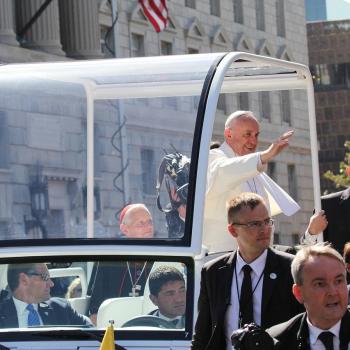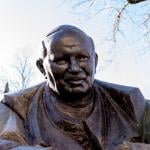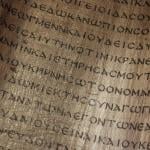KEVIN ASKS:
Is the Mormon religion considered Christian? There are radical doctrinal differences.
THE RELIGION GUY ANSWERS:
Depends on who’s talking. The steadily expanding Church of Jesus Christ of Latter-day Saints (nicknamed “LDS” or “Mormon”) vigorously defends the Christian identity proclaimed in its very name and resents assertions to the contrary. However, the Catholic Church, virtually all evangelical Protestants, and major U.S. “mainline” Protestant denominations all find the label problematic because, as Kevin indicates, the LDS church disputes central beliefs the Christian religion has taught through history.
It’s not The Guy’s journalistic role to settle this, but to note some salient aspects of the debate.
One formula comes from a leading non-Mormon expert, historian Jan Shipps. She says Mormonism is to Christianity as Christianity is to Judaism, obviously related to the older religion that helped give it birth and yet a distinct new religious community.
On the other hand, Mormon insider Terryl Givens asserts that “the faith’s congruence with the essentials of Christian orthodoxy is unambiguous,” citing especially LDS belief in Jesus as the savior. Givens, a University of Richmond literature professor who has written 10 books about his church, says that in a blog item this month. Yet he admits there are “undeniable” substantive differences in theology over against “the contemporary Christian mainstream.”
That word “contemporary” is significant because Mormons believe God established their church in these “latter days” to restore what was Jesus’ original religion, which only existed for a brief time until his apostles died off and all churches fell into permanent apostasy. Thus the church based in Salt Lake City believes it uniquely conveys God’s truth.
Givens sees LDS “adventuresomeness” in such distinctive concepts as: That the universe had no beginning so God is not the “creator” but “supreme organizer” of pre-existing matter, that “humans are co-eternal with God,” that “God himself is a material embodied being,” that God revealed holy books for the LDS church to add to the Bible, and that the Christian doctrines of original sin and God as the divine Trinity are huge errors.
Of course, there’s a flip side. From its beginnings Mormonism has cast official aspersions upon the Christian authenticity of all other churches. In the LDS Scriptures, God appeared directly to the founding Prophet Joseph Smith Jr. in 1820 and when Smith asked what church to affiliate with God directed him that:
“. . . I must join none of them, for they were all wrong; and the Personage who addressed me said that all their creeds were an abomination in his sight; that those professors were all corrupt; that ‘they draw near to me with their lips but their hearts are far from me, they teach for doctrines the commandments of men, having a form of godliness, but they deny the power thereof.’ He again forbade me to join with any of them.”
Not much basis there for concord on what Christianity is. Mormonism has rarely sought or received membership in inter-church organizations, though it cooperates on charity projects and seeks neighborly relationships. The LDS church has, however, eliminated two major points of tension. It shelved Smith’s advocacy of polygamy in 1890. In 1852 the reigning LDS prophet banned those of African descent from holding any church offices. Church authorities rescinded this unique tenet 126 years later, and after another 34 years interpreted this racial history — see www.lds.org/topics/race-and-the-priesthood.
Kevin may not be aware that The Guy and his late wife Joan co-authored “Mormon America: The Power and the Promise” (HarperOne, 1999, revised 2007), which aims at non-partisan journalistic treatment of all LDS aspects. The book scans the long history of doctrinal disagreements. A notable debate between a Catholic priest and B.H. Roberts, a prime thinker among LDS apostles, defined key differences on God as of 1901. Roberts defended Smith’s teaching that “God himself was once as we are now, and is an exalted Man” and that mortals can hope to eventually achieve godhood in the afterlife.
Exactly a century later, the Vatican changed Catholic policy and decided LDS baptisms will no longer be considered valid. Such action is rare because Rome recognizes almost all non-Catholic churches along with their baptisms. An explanatory article in the Vatican’s daily newspaper stated that the LDS rite “is not Christian baptism” because of doctrinal differences.
The article noted that Mormons recite the biblical formula of Matthew 28:19, “I baptize you in the name of the Father, and of the Son, and of the Holy Spirit.” But despite shared terminology, it said, this is not Christianity’s Triune God, “the three persons in which subsists the one Godhead, but three gods who form one divinity.” (Mormons speak of the “plurality of gods” rather than “polytheism”.) The article said this LDS “divinity and man share the same nature and they are substantially equal.” The Vatican also objected to the LDS belief that “God the Father has a wife” and that these marital partners “procreate sons in the spiritual world,” the first of whom is Jesus Christ. Yet another problem is the LDS belief that baptism “was not instituted by Christ” but dates back to Adam.
Protestants agree with Catholicism on all this. Other differences would fill a book. And have.
Kevin may also be interested in this blog’s June 14, 2013 item, “Are Jehovah’s Witnesses ‘Christian’?”
Text of Vatican explanation (2001): www.doctrinafidei.va/documents/rc_con_cfaith_doc_20010605_battesimo_mormoni-ladaria_en.html












